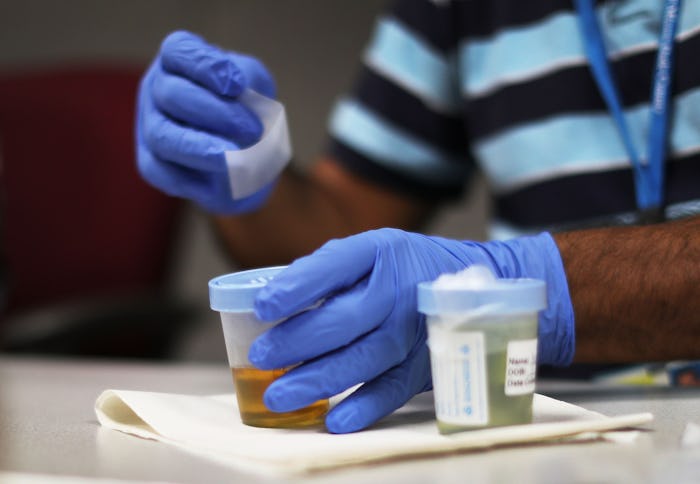Life

Why Drug Testing Medicaid Recipients Doesn't Work
On Sunday, House Speaker Paul Ryan sent forward a joint resolution passed by Congress to President Donald Trump's desk. The joint resolution overturns an Obama-era labor department rule that limited how many people seeking out unemployment insurance could be drug tested by states. This joint resolution, which Trump is expected to sign, gives more rights to states to drug test people seeking out welfare. Testing Medicaid recipients for drug use is nothing new: The GOP justifies its efforts to ensure that government funds don't fuel drug addicts's habits — but here's why testing Medicaid recipients will only worsen drug addiction in the United States.
The logic is pretty simple: If a person on Medicaid tests positive for drugs, guess what they lose? Their Medicaid — which means they no longer have health insurance, making access to addiction treatment and recovery services that much harder to obtain. This is one of the fundamental flaws behind drug testing Medicaid recipients.
But let's just call it what it really is: A Republican-led effort to further punish the poorest Americans who need the most help with healthcare, especially when it comes to drug addiction. So much for that whole "limited government" that the GOP loves to preach every chance they get.
Drug Testing Welfare Recipients Doesn't Work The Way Lawmakers Think It Will
The whole point of this wasteful exercise in taxpayer dollars is to keep those same taxpayer dollars from ending up in the hands of what politicians believe must be drug-starved welfare recipients. But when states enact these laws and conduct these drug tests, they instead find out a whole lot of nothing.
Last year, Think Progress conducted a comprehensive survey of states that tested welfare applicants for drugs. What they found was ridiculous: In 2015, 10 states spent more than $850 million on drug testing only to find a whopping 321 welfare applicants who actually tested positive for drugs (across all 10 of those states). This is your tax dollars at work, folks.
Medicaid Recipients Already Face Losing Coverage Under Trumpcare...
The American Health Care Act aims to move to block grants and set enrollment caps for Medicaid, and there's no doubt it will result in people losing Medicaid coverage. When states are given a set amount of funds to use, once they use up all the funds available or they meet their enrollment cap, they'll either have to deny new applicants or purge their rolls.
...And So Will Medicaid Recipients Receiving Addiction Treatment
The Affordable Care Act mandated mental health and addiction treatment coverage. But because the ACA is a "disaster," according to President Trump — despite the fact that 20 million more Americans got healthcare under the ACA who didn't previously have it — the AHCA plans to overturn that Medicaid mandate, beginning in 2020. This means that 1.3 million people currently receiving mental health or addiction treatment services through Medicaid will lose that benefit in three years if the ACHA becomes law as written.
Given that America is in the midst of an opioid epidemic the likes of which the nation has never faced — an epidemic hitting rural low-income Americans the hardest — it seems as though the GOP could really care less about what actually happens to the poorest Americans. Instead, many conservatives see addiction as a moral issue rather than a public health crisis, and intend to punish addicts instead of actually helping them.
This article was originally published on